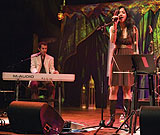|
Don’t let the rock star-like image fool you. There’s more to Gingger Shankar than just pop and hip-hop as the recent Sundance Film Festival Awards 2011 in California bears testimony. The Iranian American independent film “Circumstance” won kudos for its entire team but its music composed by Shankar stood out. Daughter of violin artist, L. Subramaniam, this Indian American songwriter, singer and music composer is someone to watch out for. Her achievements range from collaborations with composers like James Newton Howard and the alternative rock band Smashing Pumpkins; lending vocals for the Jackie Chan blockbuster, “The Forbidden Kingdom” and composing eastern arrangements with George Clinton for the Mike Myers starrer, “Love Guru.”
Shankar, who was born and raised in Los Angeles, California, revels in the joy of sounds and attributes it to the various genres of music she grew up with. “I was born and raised with music. My most prominent memories of my childhood are all to do with music,” says Shankar, who enjoyed listening to M.S. Subbulakshmi, Lata Mangeshkar, Hariprasad Chaurasia, Asha Bhosle and Ravi Shankar.

Gingger Shankar performing at the House of Blues for the Indian Film Festival of Los Angeles in California. Vivek Maddala is at the keyboard. Photograph by Gene Lewis |
Today, I realize that perhaps my work is important especially as a composer since there aren’t too many women in that area —Gingger Shankar |
Childhood also meant music training at Kalakshetra, a dance and music school in Chennai, during the few years she spent in India. Ask Shankar to describe herself and she answers quickly, “I love composing but I am an artist—a music artist. I am a combination of writer and creator.”
There was no need to decide on a career path, as being a musician seemed almost predestined. “I wish I could pinpoint a specific time I decided to work with music. [My] family was always a wonderful source of encouragement. A lot of women in the family are musicians. Watching them sing and especially seeing my parents perform on stage fuelled my inspiration. Of course, having artists like Pandit Jasraj visit home was very motivating,” says Shankar, whose mother is a classical singer.
Film music happened by chance. “It had been just about two years since I had started performing professionally. I was on tour of the [United] States with L. Shankar and troupe when I got a call from the music supervisor of the film ‘The Passion of the Christ,’ ” she says. “I was then doing Indian music for concerts and didn’t really understand what film music was all about. They had wanted a particular eastern sound for the film and I thought it would involve just a few hours’ work but ended up composing for the film. It was the toughest three months ever.”
The team’s dedication taught her some important lessons. “They were very clear about what they wanted. This made my job easier and taught me the importance of clarity,” she says.
Shankar now composes for documentaries as well. “Film music is very different from documentary score. Movies speak a different language. Documentaries are very minimal while films play out against a rich tapestry of sound,” she says.
Shankar is among the few people globally who can play the 10-string double violin. “I would put learning this on the list of the hardest things I have ever done. Travelling with too many musical instruments is cumbersome. So when L. Shankar designed this instrument that can cover the entire range of an orchestra’s bass, cello and violin, he wanted me to learn,” she says.
As a female artist of South Asian origin, Shankar says she never really paid attention in her early years to how these factors might have influenced or enhanced her musical value. “Today, I realize that perhaps my work is important especially as a composer since there aren’t too many women in that area. I feel this will open the door for more and more women as the years go by.”
She can’t decide on her favorite Indian artist but has a whole list of them on her iPod. It has been a while since Shankar has had a chance to visit India but she would love to compose for Bollywood. “I love Bollywood films,” she says. At the moment, she is busy working on her solo album, inspired by all the music and people she has been exposed to. “It’s been a few years coming,” she says. Will its release, expected early next year, be her proudest moment, yet? “I can’t really say. As a child, when I went to Carnegie Hall with my parents, they said it’s when you perform at Carnegie Hall you will know you have arrived. When I finished playing there I wanted to know, ‘what next.’ I hope to have many more of these moments in my life.”
—Courtesy SPAN
|